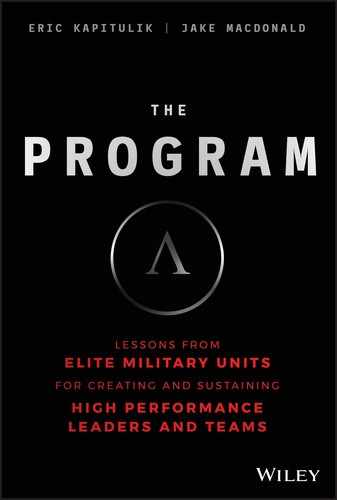63
We Work Hard
THE PROGRAM CONSIDERS working hard to be so important that it is one of the principles for success that we teach and develop (along with being physically and mentally tough, and not making excuses). Furthermore, almost every person and team believes they “work hard.” “Hard work” is plastered on hundreds of motivational posters, the backs of t-shirts, and weight room walls. Every business leader discusses it with us as a hallmark of their team. However, if hard work is vitally important for success and everyone is doing it, why are there so few world-class athletic teams, companies, and cultures? We believe it is because most people do not fully understand what hard work is and are either unwilling or unable to do it. Hard work isn’t what we do during normal business hours. Hard work isn’t a “normal” business day regardless of whether that “normal” is an 8-, 12-, or (for the investment banker readers of this book) 18-hour workday. Hard work isn’t a “normal” 3-hour, full-contact practice, either. Both a 12-hour work day and a full-contact practice, require great effort, and we appreciate the teammates and teams who give it, but great effort is not hard work. Hard Work Is One More™. It is our trademarked slogan. Hard work is not calculated on an absolute basis. Hard work is not necessarily a challenging summer workout for the college athlete or making thirty sales calls for the sales rep. Your competition does those things too. We consider doing what our competition is doing giving effort. Hard work is calculated on a relative basis. Did you outwork your competition? Did you finish your challenging workout and then do three extra sprints? Did you make your “normal” thirty cold calls and then make three more? Hard Work Is One More™. Did you outwork your competition? When we conduct our experiential training with teams, the consequence for not meeting a standard might be a set of challenging exercises for the team: sets of 6, 11, 16, 21, and 26. We let everyone else do sets of 5, 10, 15, 20, and 25. When we run, we don’t run to the 20-, 40-, 60-, 80-, or 100-yard line. We let our competition do that. We run to the 21-, 41-, 61-, 81-, and the 101-yard line. We do One More™. Make One More™ a habit.
